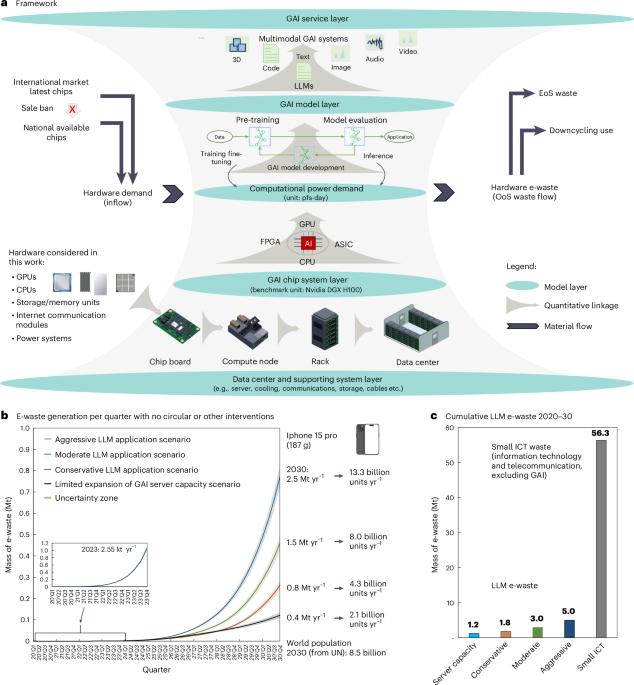E-waste challenges of generative artificial intelligence
IF 12
Q1 COMPUTER SCIENCE, INTERDISCIPLINARY APPLICATIONS
引用次数: 0
Abstract
Generative artificial intelligence (GAI) requires substantial computational resources for model training and inference, but the electronic-waste (e-waste) implications of GAI and its management strategies remain underexplored. Here we introduce a computational power-driven material flow analysis framework to quantify and explore ways of managing the e-waste generated by GAI, with a particular focus on large language models. Our findings indicate that this e-waste stream could increase, potentially reaching a total accumulation of 1.2–5.0 million tons during 2020–2030, under different future GAI development settings. This may be intensified in the context of geopolitical restrictions on semiconductor imports and the rapid server turnover for operational cost savings. Meanwhile, we show that the implementation of circular economy strategies along the GAI value chain could reduce e-waste generation by 16–86%. This underscores the importance of proactive e-waste management in the face of advancing GAI technologies. Generative artificial intelligence (GAI) is driving a surge in e-waste due to intensive computational infrastructure needs. This study emphasizes the necessity for proactive implementation of circular economy practices throughout GAI value chains.

生成式人工智能面临的电子垃圾挑战。
生成式人工智能(GAI)需要大量计算资源来进行模型训练和推理,但 GAI 及其管理策略对电子垃圾(e-waste)的影响仍未得到充分探索。在此,我们引入了一个计算力驱动的物质流分析框架,以量化和探索管理 GAI 产生的电子垃圾的方法,尤其侧重于大型语言模型。我们的研究结果表明,在未来不同的 GAI 发展环境下,电子废物流可能会增加,在 2020-2030 年期间可能达到 120-500 万吨的总积累量。在地缘政治对半导体进口的限制以及服务器为节约运营成本而快速更替的背景下,这种情况可能会加剧。同时,我们的研究表明,在 GAI 价值链上实施循环经济战略可将电子垃圾的产生量减少 16-86%。这凸显了面对不断进步的 GAI 技术,积极管理电子废物的重要性。
本文章由计算机程序翻译,如有差异,请以英文原文为准。
求助全文
约1分钟内获得全文
求助全文

 求助内容:
求助内容: 应助结果提醒方式:
应助结果提醒方式:


